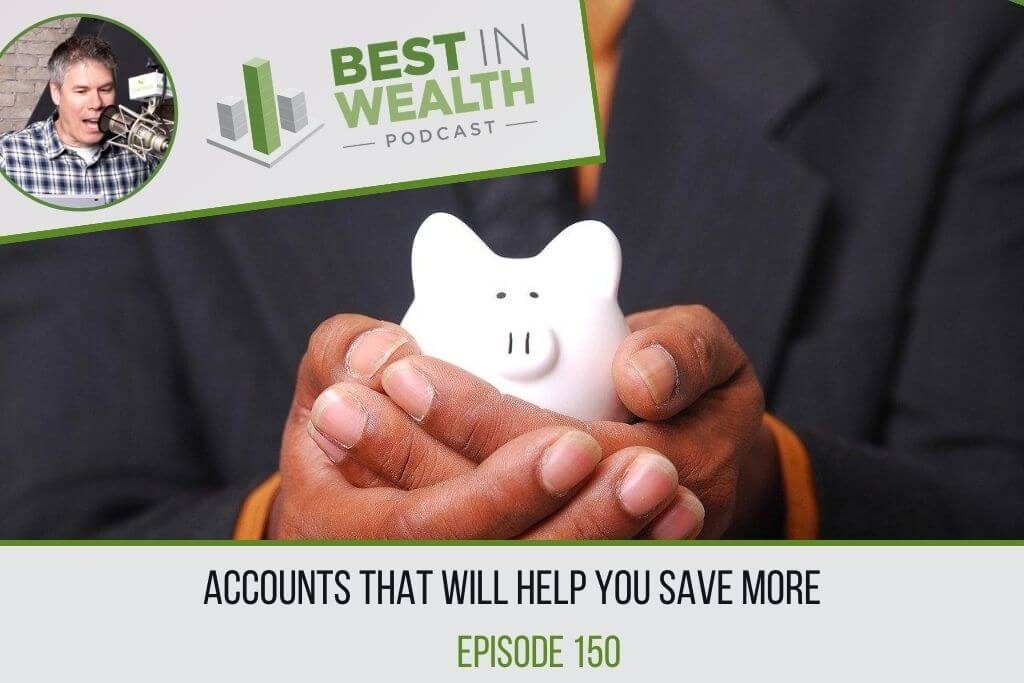Accounts that Will Help You SAVE More, Ep #150

Are you trying to figure out how to save more? Are you in debt right now? Are you motivated to get out of debt? You can use your abilities to make more and save more. But how do you accomplish that? In this episode of Best in Wealth, I share some of the accounts you can use to not only save more money—but help it grow. Financial freedom makes the stress roll off your shoulders. If you are ready to be in that place, listen to this episode for numerous strategies and resources.
What accounts will help YOU save more? Listen to this episode of Best in Wealth to find out! #wealth #retirement #investing #PersonalFinance #FinancialPlanning #RetirementPlanning #WealthManagement #DebtFree Click To TweetOutline of This Episode
- [0:34] The economy: Good news and bad news
- [5:02] Invest in depleted asset classes
- [7:04] Focus on becoming debt-free first
- [9:20] Healthcare savings: two things to think about
- [11:50] Take advantage of Roth/Roth IRA contributions
- [13:53] The Backdoor Roth
- [14:50] The Mega Backdoor Roth
- [16:15] Look into employer stock purchase plans
- [19:23] Consider an annuity or brokerage account
Become debt-free—then focus on emergencies
We want debt to be gone before you start to save more. Debt makes it difficult to truly save and reach financial freedom. Those who have adequate savings either make an incredible amount of money OR they make modest incomes but still save 30-50% of their income. How? By living below their means.
Once you have your debt paid off, your focus needs to shift towards saving. Saving what? And how? You need to start with an emergency fund. How long of an emergency fund should you save up?
- 3 months: if both spouses are working
- 6 months: if you are single
- 18 months: high-income earners or entrepreneurs
Why so much for entrepreneurs? You may want at least 18 months of expenses set aside to take advantage of mobility and business opportunities that come your way.
Health savings options: FSA and HSA
If you have a Flexible Spending Account (FSA), it is a great place to put away pre-tax money when you know you are going to be spending money on medical expenses (medical, dental, and vision). If it is through an employer, you usually have to spend it before the end of the calendar year.
If you have a high deductible health care plan, start using a Health Savings Account (HSA). If your employer does not sponsor one, you can open one with a bank (or online bank). A single person can contribute up to $3,050 a year and a married couple up to $7,100. They help your current year taxes, you save more money, and when you pay medical expenses, you do not pay taxes. Plus, you can carry the balance over to the next year.
Many people do not know this, but, if you stay healthy—you do not have to use the money on healthcare. You can keep the money in that account and invest it. Then, once you turn 65, the HSA acts like an IRA and you can withdraw that money in retirement (and hopefully get taxed in a lower tax bracket). Listen to the episode to learn more.
Did you know that you can invest the money that you keep in an HSA? I talk about this and other ways to help YOU save more money in this episode of Best in Wealth! #wealth #retirement #investing #PersonalFinance #FinancialPlanning… Click To TweetRoth IRAs, IRAs, and non-deductible IRAs
If your employer offers a 401k, you are allowed to contribute $19,500 in 2020. If you are 50+, you can contribute up to $26,000. Another option is an IRA or Roth IRA. If you make too high of an income, you will not get a tax break upfront. It will be considered a non-deductible IRA.
What does that mean? Money still grows tax-free, but when you withdraw money out, you will have to pay taxes as if it were income. So what are the income limits? As a family, you can make around $200,000 (Roth IRA contribution phaseout begins at $196,000 for married filing jointly) in taxable income and still contribute tax-free. You can contribute $6,000 (or $7,000 if you’re 50+). When it comes to the IRA contributions, if you are over the income limit, there are some neat tricks you can use to save more money.
The first one is the Backdoor Roth IRA. If you make a non-deductible contribution to a traditional IRA because you are a high-income earner, we can turn around and convert that traditional IRA into a Roth IRA because there is no income restriction on the conversion.
The second option is the Mega Backdoor Roth. If you contribute $19,500 to your 401k, you max out and can not contribute more. But, TWO things may allow you to make a higher contribution (and very few 401k plans allows this):
- Your 401k plan must allow after-tax contributions
- Your 401k plan allows in-service withdrawals on after-tax contributions while you are working
Both of these things allow for the potential of a Mega Backdoor Roth IRA contribution. With this type of Roth, you can put in up to $37,500 (amount will be dependent upon 401k plan rules) that you can convert to a mega backdoor Roth IRA every single year. Both of these options get complicated, and there are other rules involved, so feel free to reach out to me with questions.
How to save MORE for retirement
If you still have excess income and would like to save more, look into employer benefit plans, such as a stock purchase plan. If you are a business owner, you could also open a SEP IRA or Solo 401k. You could even start thinking about your kids—do you want to pay for their college? If that is something you are open to, you could open up a 529 Plan to begin saving for their education. There is a lot of misinformation out there that you need to know in order to do everything right—schedule a chat with me to talk more about it.
You can also purchase an annuity. There are very few out there that I would recommend, but some are sold with low commissions, no surrender charges, and you can put money away after-tax that grows tax-free. Those gains become income in retirement. Lastly, you could open up a brokerage account—it is a far better option than a simple savings account. Why? Listen to the whole episode for more details on how YOU can save more!
How do you save MORE for retirement? What are the best ways to save more? Listen to this episode of Best in Wealth for my thoughts! episode of Best in Wealth! #wealth #retirement #investing #PersonalFinance #FinancialPlanning #RetirementPlanning… Click To TweetConnect With Scott Wellens
- Schedule a discovery call with Scott
- Send a message to Scott
- Visit Fortress Planning Group
- Connect with Scott on LinkedIn
- Follow Scott on Twitter
- Fortress Planning Group on Facebook
Podcast Disclaimer:
The Best In Wealth Podcast is hosted by Scott Wellens. Scott Wellens is the principal at Fortress Planning Group. Fortress Planning Group is a registered investment advisory firm regulated by the Securities Act of Wisconsin in accordance and compliance with securities laws and regulations. Fortress Planning Group does not render or offer to render personalized investment or tax advice through the Best In Wealth Podcast. The information provided is for informational purposes only and does not constitute financial, tax, investment or legal advice.



